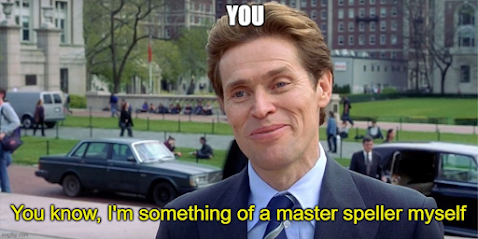Spelling Errors Galore
Have you ever struggled with spelling? It's okay. You can admit it. Spelling words correctly can be incredibly difficult, and it's not something that is going to go away because you passed all your spelling tests as a kid. The truth is: We aren't usually taught how to spell. We're taught how to memorize spellings, and there are frankly too many words in the English language for this method to be sustainable.
Created via the imgflip meme generator
The Rules You Probably Already Know
If your spelling education was anything like mine, I'm sure you learned a few basic rules. The one that comes to my mind right away is the "i before e except after c" rule. I still repeat that in my head sometimes when trying to decide how to spell common words like "their." Of course, I also learned how to sound out words, but both of these rules hit roadblocks. What about words like "caffeine"? That i isn't before the e, and there's no c before it. And what if I tried to sound out that word? I would most certainly spell it "caffine."
 |
| Created via the imgflip meme generator |
Double Letter Errors
There are rules, though, that most of us never learned. Because of this, certain types of spelling errors run amok. For example, did you know that a double letter in the middle of a word makes the preceding vowel short? I didn't until a few weeks ago. Let's look at some misspelling examples that could have benefited from this rule.
With just one l, this word would be pronounced with a long o sound. Of course, we know that this is not the case. "Collected" is spelled with two l's, thus making the o have a shorter, u-like sound. Here's a more confusing example:
I made this mistake after learning this rule. I was thinking about the word "target" and how it has a short e sound, so I figured I should double the t. This spelling is wrong, though. But why? "Targeted" is a verb that has been made past tense. When this is the case, and the verb is more than one syllable long, the spelling of the word itself usually won't change. Unfortunately, though, the rule is more complicated than this. Words like "targeted," "marketed," "supported," and the like are not going to need a double letter because they're simply modifying a word that already has a distinct spelling. However, if the word is only one syllable long and ends in one consonant and one vowel, then the final consonant should be doubled before adding a suffix beginning with a vowel. This is the case in words like "manned," "fanned," and "balled." There is more to this rule which creates exceptions, but it's extraordinarily complicated and has to do with stressed versus unstressed syllables, so I won't get into it. Suffice it to say that the final consonant in multi-syllable words is usually not doubled when adding a suffix beginning with a vowel.
Created via the imgflip meme generator
Vowel Confusion
Another large portion of issues comes when dealing with vowel placement. Because many of us first learned to spell by sounding out words, silent vowels can create all kinds of confusion. The following example demonstrates this.
Did you catch the error? It's right there in the title. "Adequatly" is not how you spell that word. Perhaps the creator of this Reddit post was trying to sound out the word. However, they neglected to remember an important spelling rule. The -ly in "adequately" begins with a consonant. In general, you don't change the spelling of words when adding a suffix beginning with a consonant. Again, there are exceptions, such as the words "argument" and "truly," but this rule holds true in most cases.
Created via the imgflip meme generator
Are you starting to see the issue here? Let's look at one more common spelling issue dealing with vowel troubles.
Oh, gorgeous. Why must you be SO HARD to spell? Perhaps because not enough people know a simple spelling rule. In the word "gorgeous," the g makes a j sound. According to the rules of spelling, that can only occur when the g is followed by an e, i, or y. Of course, the other two letters wouldn't make a lot of sense in this word, so the e is added. Then, the g makes a j sound, and the rest of the spelling of this word is simple.
Created via the imgflip meme generator
How Can We Apply Rules We Don't Know?
It's true that a lot of spelling rules just aren't taught in school. As such, if we haven't learned how to memorize certain spellings in school, we are bound to get them incorrect. So, what do we do? I encourage all of you to look at difficult-to-spell words and ask yourself, "Why is it spelled that way?" If you can't figure it out, look it up. Perhaps you'll learn a new spelling rule you didn't know existed.
Created via the imgflip meme generator











